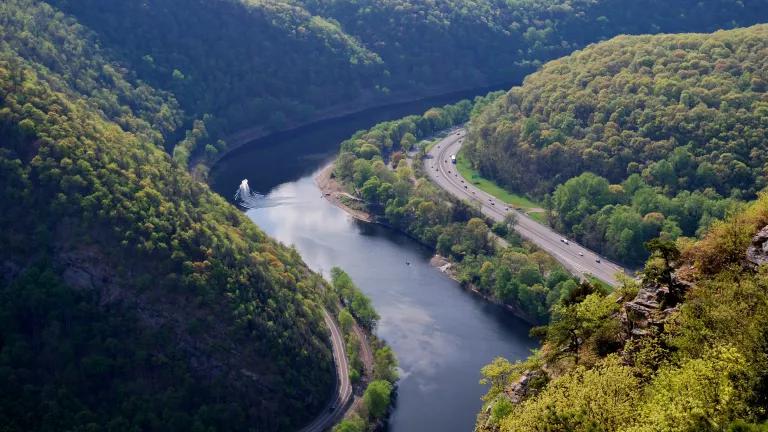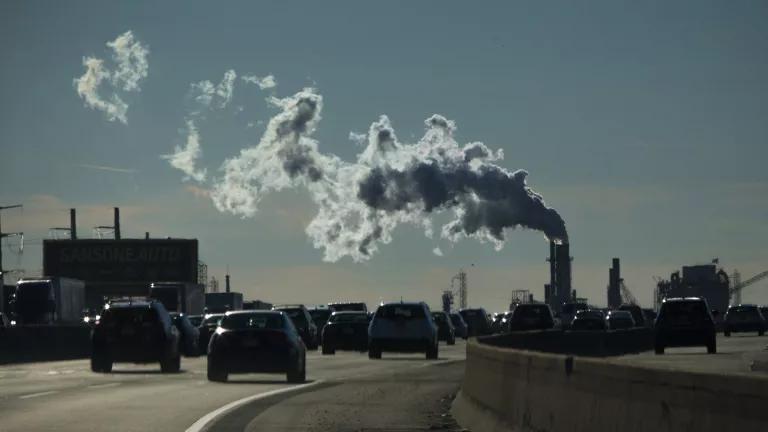Proposed LNG Project Threatens our Climate and Communities
We must stop plans to build a new fossil fuel export project on the majestic Delaware River. The proposed facility would be disastrous for our climate and our communities.

A proposed fossil fuel export facility threatens our majestic Delaware River.
Plans are quickly moving forward on a new fossil fuel project on the majestic Delaware River. The project could not only contribute to climate change—it could also pollute the River with dangerous levels of toxic PCBs.
As early as next week, the Delaware River Basin Commission may vote to give the project the final go-ahead. But there’s still time to stop this fossil fuel project from being built.
An Unprecedented Fracked Gas Facility on the Delaware River
The project, proposed by Delaware River Partners, a subsidiary of New Fortress Energy, would expand a deep-water port terminal on the Delaware River to export liquefied natural gas (LNG). The facility would be located at the innocuous sounding “Gibbstown Logistics Center” in Gibbstown, New Jersey, a populated suburban area along the banks of the Delaware River across from Philadelphia.
But the project is far more menacing than its name suggests.
If approved, the Gibbstown Logistics Center would be the first liquefied natural gas project in the Delaware River Basin. It would require hazardous fracked gas from Pennsylvania to be transported more than 200 miles by truck and rail through residential neighborhoods. That fracked gas would then be sent down the Delaware River on huge shipping vessels for sale overseas.

Location of Gibbstown Logistics Center on the Delaware River
A Major Threat to our Environment and our Communities
Every aspect of the project’s operations poses enormous risks to our environment and our communities.
For starters, the very existence of the Gibbstown facility accelerates the burning of dirty fossil fuels. Fossil fuels are the leading driver of global climate change; when they are burned, they release dangerous greenhouse gases into the atmosphere, heating our planet.
Liquefied natural gas (LNG), which the Gibbstown facility would export to destinations across the globe, is particularly harmful. In every step of its life cycle—from extraction to processing to storage to transportation—LNG emits methane. And methane is one of the most powerful climate change-inducing greenhouse gases, known to be 84 times more potent than carbon dioxide.
Furthermore, LNG is potentially explosive—even the tiniest leak can set off devastating fires and explosions. The Gibbstown project would move LNG over hundreds of miles and through heavily populated areas in Pennsylvania and New Jersey. The proposed truck and rail routes would rip through Black, Brown, and low-income communities and bring up to 1,650 more truck trips and two 100-railcar trains full of natural gas to Gibbstown every day, polluting the air and putting thousands of primarily Black, Brown, and low-income residents at risk of deadly accidents.
Read more about the catastrophic climate impacts of exporting LNG in this recent NRDC report.
Construction of the Gibbstown port facility could also irreparably damage ecosystems in the Delaware River Basin. The Delaware River Basin—the catchment area of the United States’ longest free-flowing river east of the Mississippi—is one of the most important fisheries in the nation and is a critical habitat for countless species of flora and fauna. More than 45 acres of river would be dredged during construction of the Gibbstown project, threatening rare habitats that sustain aquatic life, like the endangered Atlantic and shortnose sturgeon. Dredging also threatens to impair water quality in the Basin, which now provides pristine drinking water to approximately 16 million people, or 5 percent of the total U.S. population.
What’s more, as NRDC has cautioned, the current Gibbstown proposal could release toxic PCBs into the River. PCBs, or polychlorinated biphenyls, are man-made toxins that are known human carcinogens and one of only a handful of chemicals ever banned in the United States. PCBs are present on both the land of the proposed Gibbstown facility as well as in the abutting Delaware River sediments. In fact, the proposed site is the former Dupont-Chemours-Repauno chemical site, which has historically served as one of the top 10 biggest PCB loading point-source facilities in the Delaware Estuary.
Releasing even tiny amounts of PCBs is an environmental and public health threat. Consumption of PCBs has been linked to adverse impacts on reproductive, immune, and endocrine systems, and can be especially dangerous to pregnant women and their unborn children.
Significantly, the Gibbstown project appears to be out of compliance with strict federal, state, and DRBC rules governing PCB pollution of the Delaware River. Those rules—which relate to the federal Clean Water Act’s “Total Maximum Daily Load” program—establish the maximum amount of toxic PCBs allowed to enter the section of the Delaware River where this terminal would be located. As it stands now, the project’s sponsors, Delaware River Partners, have failed to put in place an enforceable plan to prevent PCBs from seeping into the River, and despite a DRBC directive to do so.
There’s Still Time to Halt this Reckless Project
We can still prevent this dangerous project from moving forward. The federally created Delaware River Basin Commission is the last entity that can block the Gibbstown Logistics Center. The Commission—which includes the governors of New York, New Jersey, Pennsylvania, and Delaware and a representative from the federal Army Corps of Engineers—is responsible for regulating activities affecting water quality in the Basin. They may vote to give final approval to the Gibbstown facility at their upcoming meeting on December 9.
NRDC and our partners at Delaware Riverkeeper Network strongly urge the Commission to defer any final vote on the Gibbstown LNG proposal. The Commission must first fully examine the serious climate implications, potential PCB contamination, and other environmental issues before they make a final decision.
There is simply too much at stake to risk irreparable damage to the Delaware River Basin, to its human and aquatic inhabitants, and to the health of our planet’s climate.



